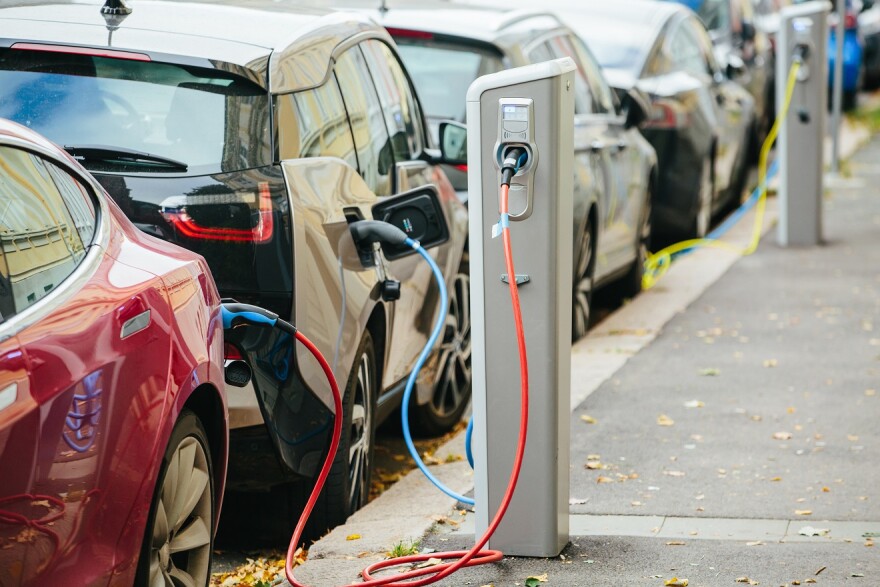One statewide elected official in Florida is applauding the passage of a massive federal infrastructure package: State Agriculture Commissioner Nikki Fried.
On Tuesday, Fried, a Democratic candidate for governor, explained at a press conference in Miami that the $1.2 trillion includes billions of dollars for the state. “It will better the lives of Floridians and build a brighter future for our entire state.”
After President Joe Biden signs the "Infrastructure Investment and Jobs Act" into law, the state will get more than $19 billion in federal funding over the next five years for the state’s roads, bridges, public transportation and airports, along with its electric-vehicle charging network, broadband infrastructure and clean water projects. It would also allocate funding to help mitigate the effects of climate change.
Here’s how a White House fact sheet breaks down how much the state would likely receive:
- $13.1 billion for federal highways
- $245 million for bridge replacement and repairs
- $198 million for electric vehicle charging stations
- $2.6 billion for public transportation
- $100 million to expand high-speed internet access
- $26 million to protect against wildfires
- $29 million to guard against cyber attacks
- $1.6 billion for clean water projects
- $1.2 billion for airports
The fact sheet notes the amounts could change based on economic factors.
Under the legislation, state and local governments could apply for billions more in funding. Fried says the federal infrastructure dollars will benefit communities even more if properly leveraged. “If done creatively, done smartly we can lure in other private investment to be partners in some of these projects,” she said. “It’s also going to be partnered with other local and state projects, so it’s not just federal dollars.”
Fried says she pressed federal officials to prioritize expanding broadband access and the state’s network of electric-vehicle charging stations.
The federal government estimates 13% of Floridians — or 707,000 residents — lack access to high-speed internet. “It is great news for those hundreds of thousands of Floridians,” Fried said. She explained residents need broadband “to stay connected with with their communities, with their work, with their school and their health care.”
Under the $1.2 trillion federal infrastructure bill, Florida would get at least $100 million to expand broadband access. Low-income residents could also apply for tax credits to offset the cost of high-speed internet service.
Fried says the nearly $200 million that Florida is expected to get for electric vehicle charging stations will support her office's "electric-vehicle roadmap."
"It was very exciting to see the infrastructure bill prioritized building a nationwide network of EV chargers."

The spending bill is expected to invest $245 million in the state's bridges and $13.1 billion in its highways. According to the fact sheet, the state has 408 bridges and 3,564 miles of highway in "poor condition."
Gov. Ron DeSantis, a possible GOP presidential pick in 2024, hasn’t expressed support for the package. Instead he's described the legislation as "pork-barrel spending." The bill is part of Biden’s “Build Back Better" agenda.
DeSantis also pivoted when asked about the bill on Monday. Instead of talking about infrastructure, he focused on the legislation’s "national motor-vehicle per mile user fee pilot" program, in which volunteers from every state would pay a certain amount based on how many miles they drive annually. The program would run from 2022-2026 and is designed to test the effectiveness and acceptance of a national mileage fee. Those revenues would go to the Highway Trust Fund to provide long-term maintenance to roadways.
“They want to monitor the mileage that you’re driving on your car, and then tax you for the mileage,” DeSantis said. “That will never fly in the state of Florida. We are not going to let that happen.” If a national "mileage tax" were to take effect, it would happen after the pilot program expires.
Speaking to reporters on Tuesday, DeSantis also questioned the fairness of the funding formula used to determine how much states receive. “It seems like a disproportionate amount of money is going to New York and New Jersey,” he said. “How does Florida make out compared to some of these other states?”
Though the bipartisan infrastructure spending bill gained support from more than a dozen Republicans in Congress, the state’s GOP congressional delegation voted against it.
Senators Rick Scott and Marco Rubio also voted against it.
Rubio's office issued the following statement after his vote: "This bill was negotiated in secret, rushed through the process without meaningful opportunities to have input, and adds a net increase of $350 billion to the national debt. I can’t vote for a bill like that.”
In state Agriculture Commissioner Nikki Fried's view, the spending package should've received more support from Republicans.
“Nothing in this is partisan. It’s about investing in our communities, investing in our residents and investing in our future,” Fried said. “Unfortunately, I‘m likely to be the only statewide elected official talking about the ways it will benefit our state.”
Copyright 2021 WFSU. To see more, visit WFSU. 9(MDAyNDY5MjM1MDEyODE2MzMyMTZmZDQwMg001))






